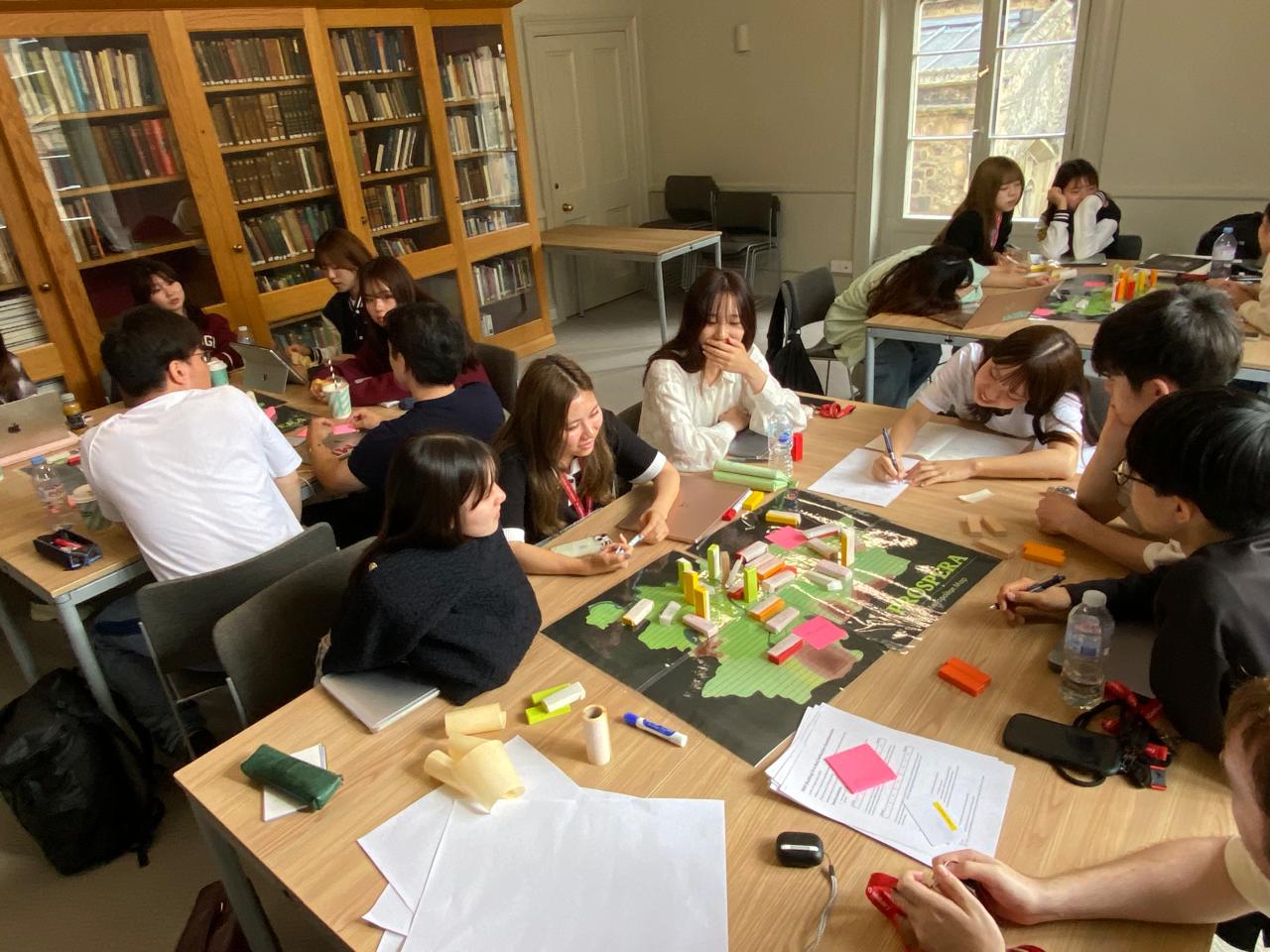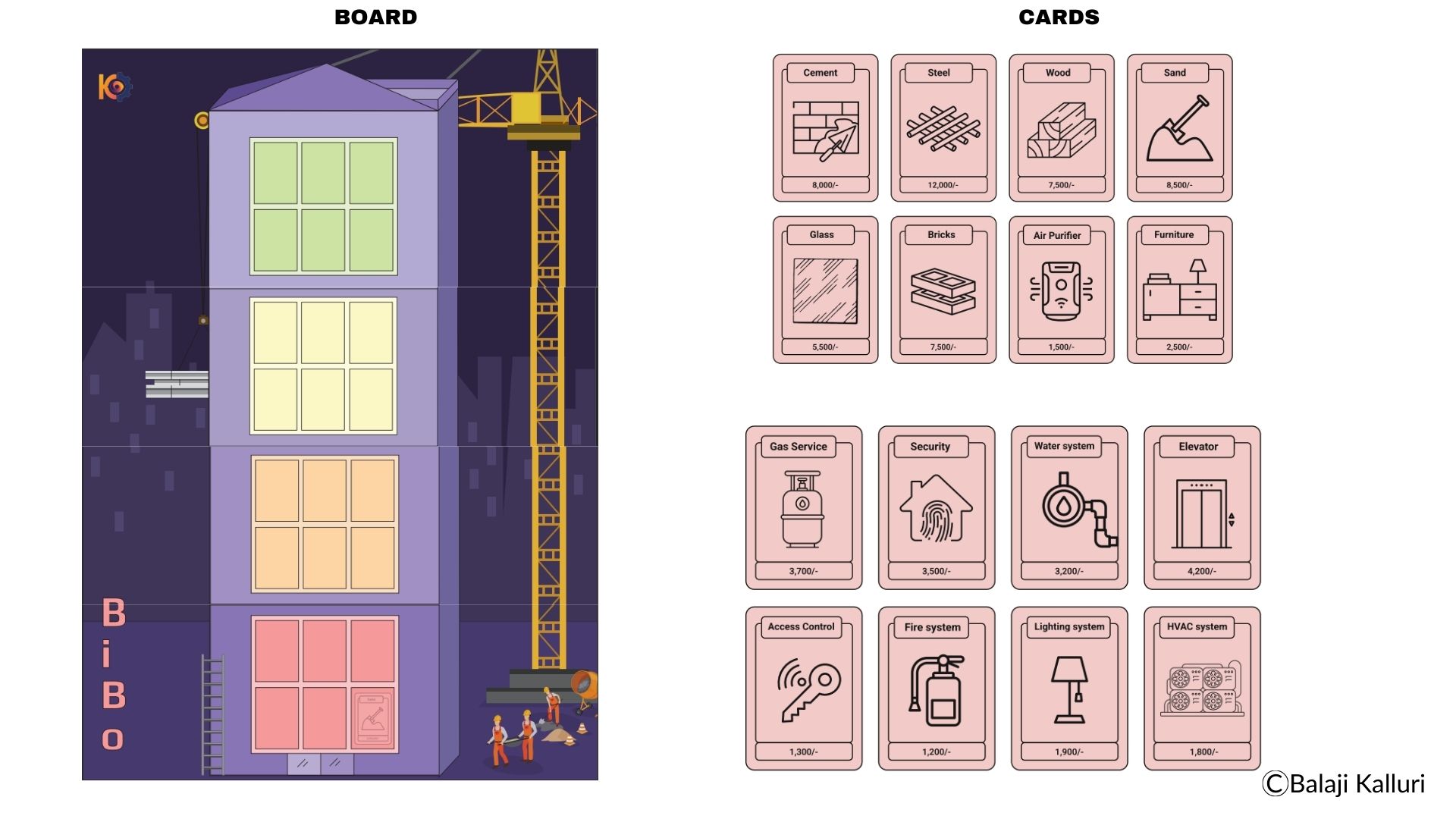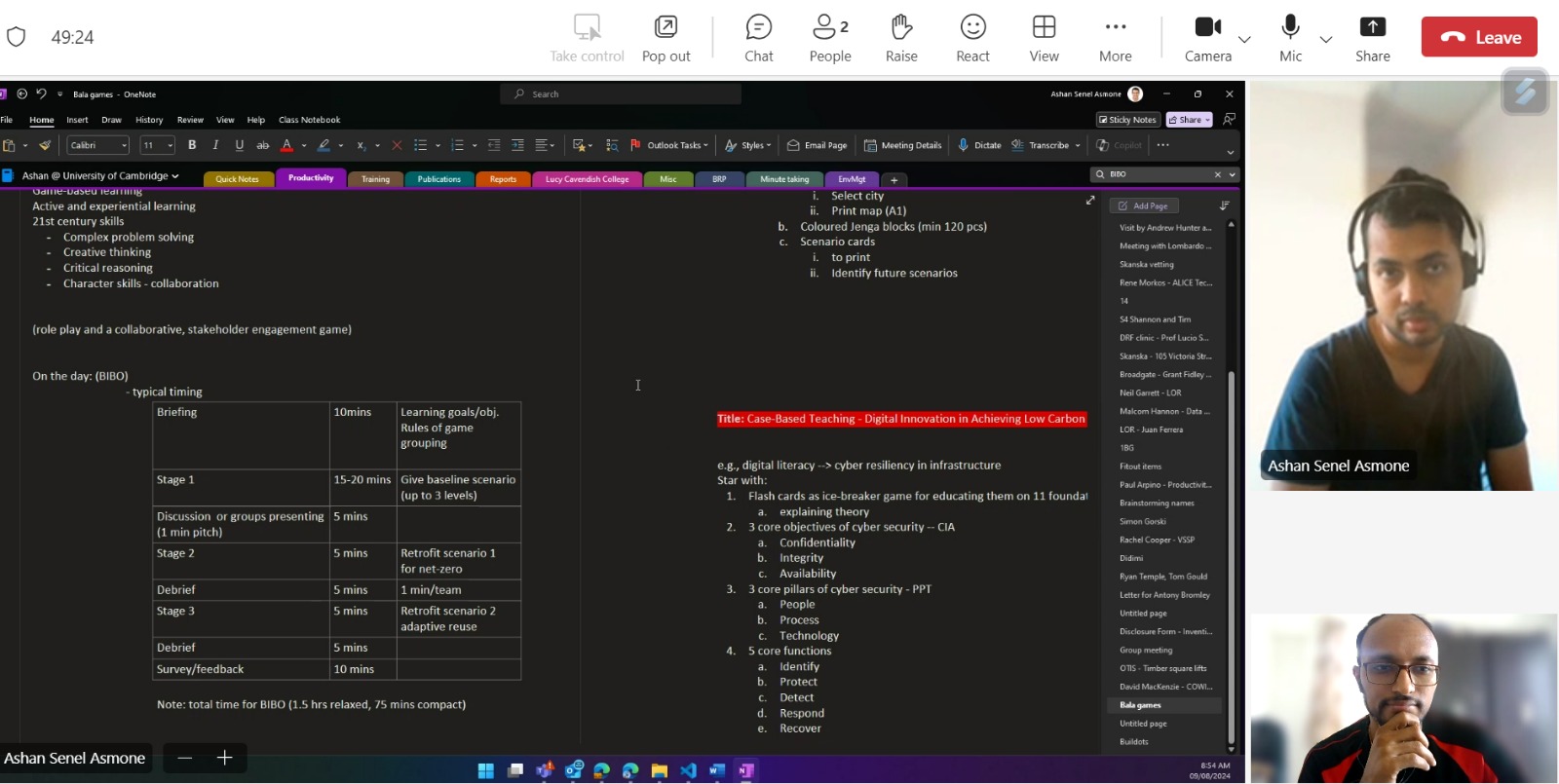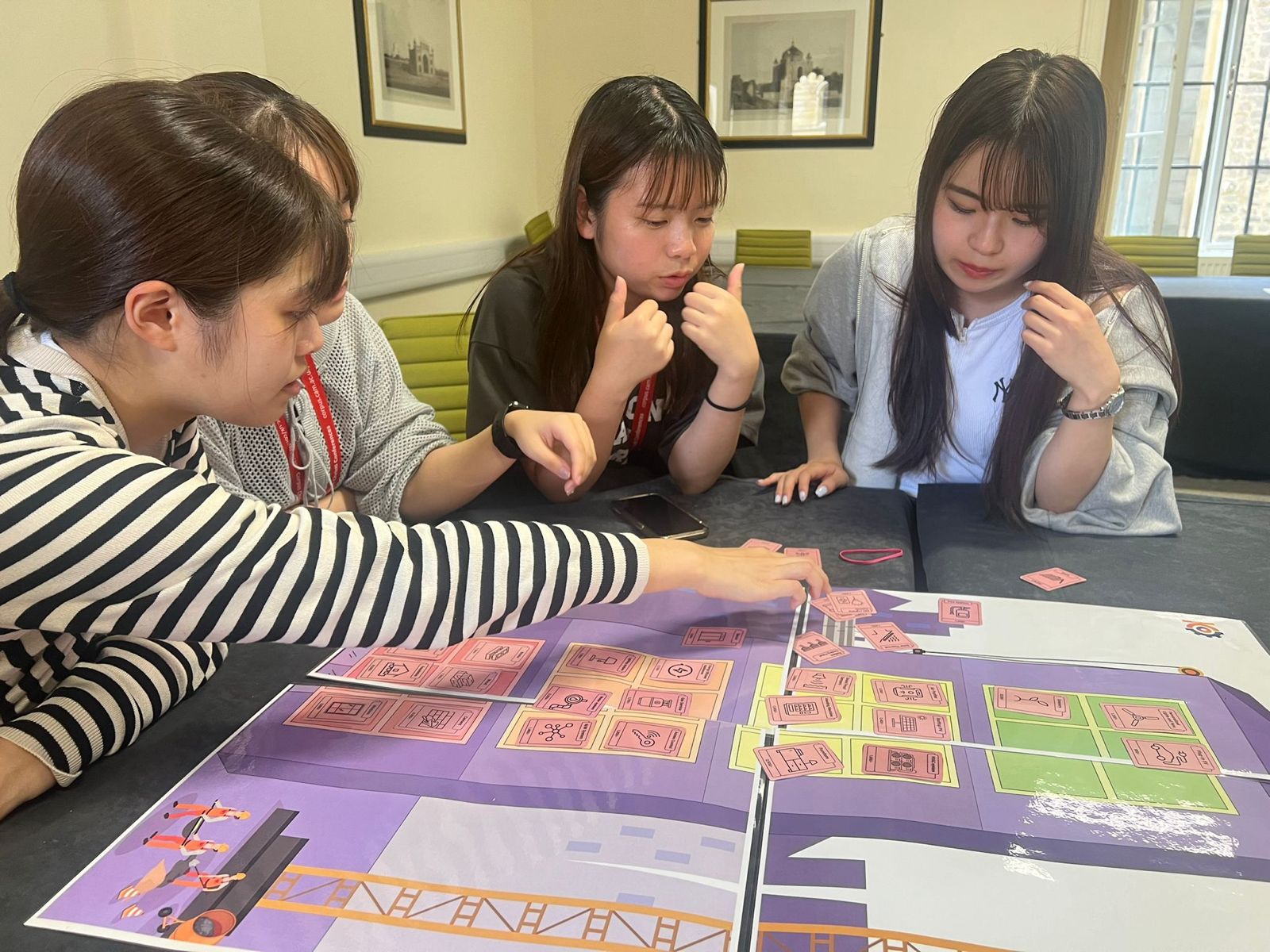12 December 2024
Game Changers: Innovating Education for a Sustainable Future
NUS School of Design and Environment alumni Dr Balaji Kalluri (PhD ’17) and Dr Ashan Asmone (PhD ’20) are preparing future environmental leaders through a game-based approach to learning

Environmental leadership students attending a summer session at the University of Cambridge play Prospera, a game designed by Dr Balaji Kalluri.
As graduate students at the National University of Singapore (NUS), Dr Balaji Kalluri and Dr Ashan Asmone bonded over their passion for advancing sustainability in the built environment. Now, years after their graduation, they are collaborating across continents in their capacities as educators, helping to develop the next generation of changemakers and innovators through gamification and experiential learning.
“We both have a shared interest in shaping the urban transition pathways of cities in the Global South,” said Dr Balaji, now an Assistant Professor of Environmental Studies at FLAME University in his home country of India. “There are so many trends affecting urban development—including climate change, geopolitics, urbanisation, and digital transformation—that will require multidisciplinary approaches and solutions.”
.png?sfvrsn=c88871b0_0)
Dr Balaji Kalluri (left), a systems engineer turned urban futurist, is currently an Assistant Professor at FLAME University in India. Dr Ashan Asmone (right) is a researcher at the Laing O'Rourke Centre for Construction Engineering and Technology at the University of Cambridge’s Department of Engineering in the United Kingdom.
The NUS alumnus is the inventor behind Urban eXperiential Learning, or UrbanXL, a suite of multi-player collaborative games designed to educate and equip students on the design of liveable and sustainable cities, building construction, urban governance, and cyber resiliency.
Pointing to his experience as a postdoc in Denmark as inspiration, Dr Balaji noted many Nordic and Scandinavian countries are taking transformative approaches to reimagine education as socially impactful, less stressful, and more joyful—while imparting skills such as analytical thinking, complex problem solving, and creativity. Likewise, his experience at FLAME, a liberal arts management university, has influenced his ethos about the role of education in developing active, global citizens.
“The hope is to spark a deeper connection with these issues, so students don't just see education as a means to employment, but as a way to actively engage in solving the world's problems. Games can be a powerful tool in helping students build the intellectual capacity and attitude to analyse and navigate the pressing social and environmental transitions we face."
The UrbanXL suite:
- Prospera; a board game wherein students design a hypothetical city, learning about strategic decision-making, urbanisation, urban agglomeration, and urban sprawl
- Building-in-a-Box (BiBo); a board game focused on the lifecycle of architectural design, building construction, and facilities management
- City Runner; a board game that decodes the complexity of urban governance, providing exposure to concepts such as participatory governance, fiscal health, and quality-of-life
- CybFlash; a flashcard-based game that facilitates understanding of cyber resiliency in urban environments, including utility grids and transportation hubs

A close-up of the BiBo game.
Since its development in 2023, UrbanXL has made its way around the world, from its initial pilot in India, to countries such as Norway and the Netherlands. Along the way, these innovative serious games have also earned recognition from the Council for Creative Education Finland, which lauded Dr Balaji’s efforts in advancing creativity in teaching and learning.
When Dr Balaji contacted his former NUS classmate and friend Dr Ashan earlier this year to gauge his interest in using UrbanXL within his classroom, the answer was an immediate yes.
“I’ve always been a proponent of the flipped classroom, and I try to stay on the lookout for new techniques and creative pedagogies to improve my teaching,” said Dr Ashan, a Sri Lankan native and current Research Associate at the Laing O'Rourke Centre for Construction Engineering and Technology at the University of Cambridge. Incorporating the suite of games into his summer class on environmental leadership, Dr Ashan noted that the reception from students has been “phenomenal”.

Dr Ashan (top) and Dr Balaji (bottom) collaborated virtually in preparation for the deployment of UrbanXL within a summer programme held at the University of Cambridge.
“In a traditional lecture, you don’t get immediate feedback. You don’t know if students are listening, if they’re asleep, or how well they comprehend the material,” said Dr Ashan. “But by using the games, I could instantly see how excited the students were to learn.”
He added that while there has been a rush by universities to incorporate technology such as apps and simulation software in education, the strength of UrbanXL lies in its simplicity and open-ended design. “We had three different groups of students planning three hypothetical cities, and they went in three different directions due to their group dynamics and understanding, which was personally fascinating to watch.”

Students at the University of Cambridge playing BiBo, a game within the UrbanXL suite.
But application of UrbanXL does not stop at the undergraduate level, according to Dr Balaji. The suite of tools has also been deployed in the training of Indian military service professionals interested in sustainable building construction, as well as policymakers and public administrators concerned with people-centric city governance.
To help scale the solution, Dr Balaji is reaching out via his network, while keeping the games accessible to collaborators without license fees, in the spirit of open innovation. Inspired by the story of Climate Fresk, a climate-change card game, he also hopes to build and establish a digital platform for UrbanXL users worldwide to exchange ideas and collaborate on research and outreach activities.
What is of particular significance to Dr Balaji, however, is that both he and Dr Ashan are drawing on their perspectives as research scholars and educators from former British colonies.
“Education has long been dominated by colonial thinking, but there’s a growing movement to make it more inclusive and to recognise the innovation emerging from the developing world,” said Dr Balaji. “We are two alumni from two countries in the Global South who met in Singapore and are now in India and the United Kingdom, creating new intellectual property and teaching future leaders and innovators.”
At the same time, both are quick to credit NUS for the role the University has played in their personal and professional development, citing the opportunities an NUS degree has provided them.
“I know for sure that I am in Cambridge today because of NUS and for no other particular reason,” said Dr Ashan. “I’m very happy to be an NUS alumnus; the University has helped and continues to help open doors around the world for me.”
Dr Balaji agreed, noting that a recent trip to Singapore with his four-year-old daughter gave him the opportunity to show her the campus that was so formative to his growth. “NUS was a passport to the world for me,” he said. “And I hope in my capacity at FLAME, that I can also help build a bridge back, strengthening ties between our institutions and countries."
Text by Katherine Chinn. Photos courtesy of Balaji Kalluri and Ashan Asmone.